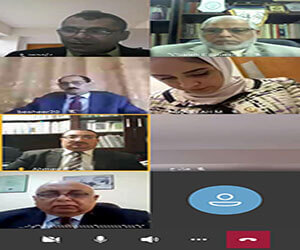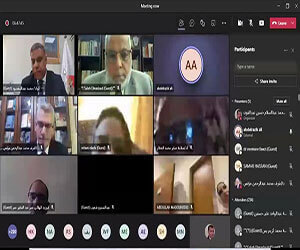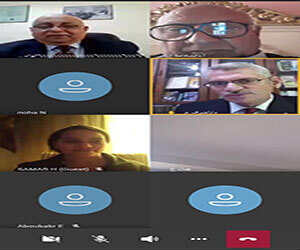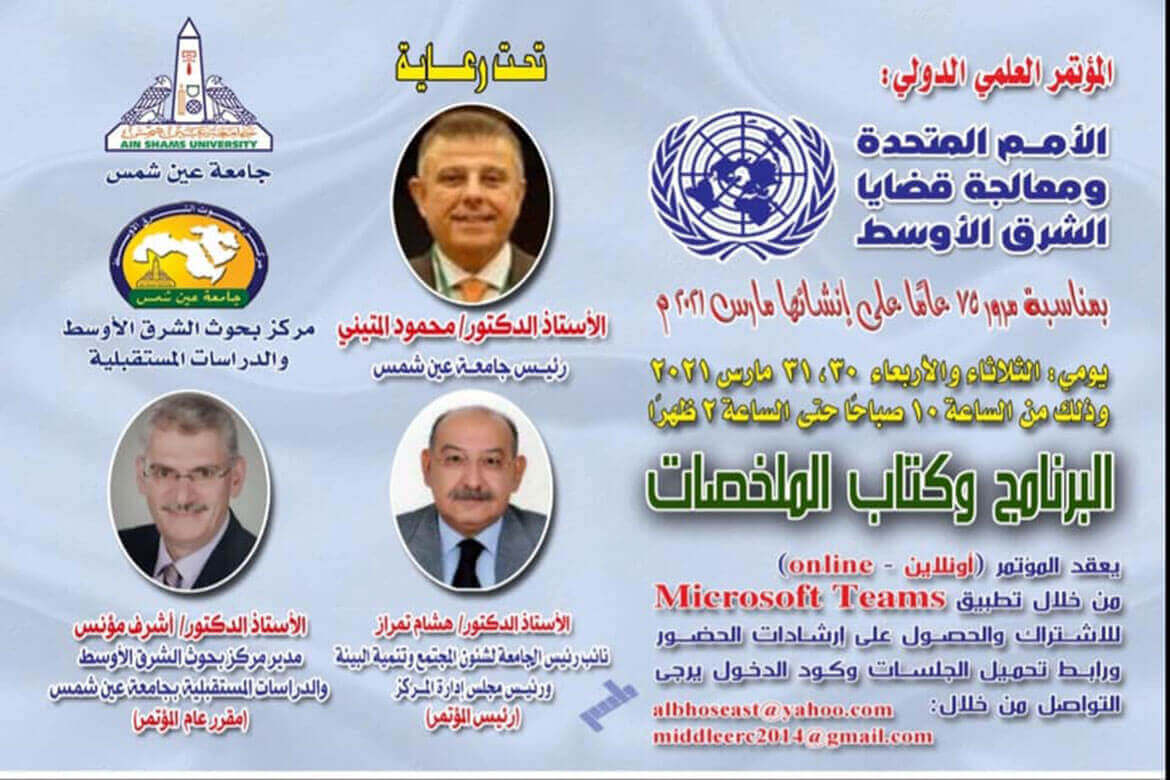The launch of the activities of the "United Nations and Addressing Middle East Issues" conference at the Center for Middle East Research and Future Studies
Under the auspices of Prof. Dr. Mahmoud El-Metini, President of Ain Shams University, and Prof. Dr. Hisham Tamraz, Vice President for Community Service and Environmental Development, the international scientific conference under the title "The United Nations and Middle East Issues" was launched on the occasion of the 75th anniversary of its establishment, which is held with video conference technology.
This conference marks the 75th anniversary of the establishment of the United Nations, which is the first and most important international Organizations concerned with achieving international peace and security.
The center's "United Nations and Addressing Middle East Issues" conference aims to introduce the United Nations and its global activities, monitor its role in the Middle East, and analyze its political, economic, social and cultural activities in the region.
The conference also seeks to highlight the role of the United Nations towards refugees in the Middle East, the role of UN peacekeepers in the Middle East, the political influence on the United Nations and its role in managing the political and military conflict, as well as the influence of major powers on grants and aid in the Middle East and the external influence on the United Nations In making decisions.
During the opening session of the conference, Prof. Dr. Hisham Tamraz, Vice President of Community Affairs and Environmental Development and Chairman of the Center's Board of Directors, pointed to the enormous size of the challenges that the United Nations faced, such as regional wars, disputes over water and the proliferation of weapons of mass destruction, and perhaps the biggest challenges faced by the challenges of international terrorism and others. Facing other challenges.
Prof. Dr. Hisham Tamraz emphasized the pioneering role that some United Nations organizations play in developing poor countries as well as achieving sustainable development and providing economic aid through the International Monetary Fund as well as the Food and Agriculture Organization and others.
Prof. Dr. Hisham Tamraz expressed his appreciation to the organizers of this conference, stressing the importance of coming up with important directives that would clarify the vision during the coming period.
 |
 |
 |
||
Prof. Dr. Ashraf Mons, Director of the Center and the General Rapporteur of the conference, pointed to the great importance of the United Nations Organization, which is the largest international organization in the world, as it includes 193 countries under its roof, including 22 Arab countries, and the establishment of the United Nations came in the wake of World War II in an attempt by the countries of the world To heal the rift and repair the huge amount of destruction and devastation that resulted from the war. Indeed, the United Nations Charter was signed on June 26, 1945 by 50 countries, including five Arab countries, namely: Egypt, Saudi Arabia, Lebanon, Syria and Iraq, and from the Middle East countries Iran and Turkey.
The first day of the conference included two sessions, the first session was chaired by Major General Mohamed Abdel Maksoud, Head of the Crisis and Disaster Management Sector at the Information and Decision Support Center in the Council of Ministers and a member of the Center’s Board of Directors.
A number of researchers participated in the first session: Prof. Dr. Saleh Hassan Al-Maslout, Professor of Modern and Contemporary History at the Faculty of Arabic Language in Zagazig, Al-Azhar University Branch, presented a paper entitled "The Arabs' Position on the United Nations Resolution on the Partition of Palestine in 1947 AD," and Prof. Dr. Mona Sobhi Nour El-Din, assistant professor of economic geography at Al-Azhar University, presented a research entitled "The future of Egyptian-Sudanese relations and their role in achieving water security and development projects." , Dr. Fayza Khattab, researcher at the Center for Middle East Research and Future Studies, who presented a paper entitled "The Role of the United Nations in the Arab and Israeli Conflict”, Prof. Dr. Abbas Mohamed Sharaqi, Professor of Geology and Water, Faculty of Higher African Studies at Cairo University, participated in presenting a paper entitled "The Ethiopian Renaissance Dam between Engineering Construction and the United Nations." , and Dr. Abdel-Razek Mohamed Ali, teacher of modern and contemporary history at the Faculty of Arts, Alexandria University, presented a paper entitled "The position of the United States of America towards the selection of the headquarters of the United Nations in 1945 AD: a study in light of the documents of the US State Department”.
The second session of the conference’s activities was held today, chaired by Major General Pilot Dr. Hisham Al-Halabi, the advisor at the Nasser Military Academy and a member of the center’s board of directors. Participated in the second session: Prof. Dr. Ahmed Mishaan Al-Najm, Lecturer of International Relations at the Faculty of Law and Political Science, Anbar University, Iraq. He presented a paper entitled "The United Nations Policy on Middle East Security: Combating the Proliferation of Weapons of Mass Destruction as a Model", Dr. Samar Ibrahim Mohamed, a teacher of political science at the Canadian Al-Ahram University and a member of the Egyptian Council for Foreign Affairs, presented a research entitled "The Role of the United Nations Organization in Protecting the Syrian Cultural Heritage", and Dr. Ahmed Jalal Mahmoud, a teacher of political science at the Faculty of Economics, Suez Canal University, reviewed a research entitled "The effectiveness of the role of the United Nations in combating terrorism and its impact on the security of the Middle East," and Dr. Ahmed Abdel Salam Khader, Associate Lecturer, Department of Islamic Sharia, Helwan University, who presented a paper entitled "Causes of International Terrorism and Methods of Combating It in International Law and Islamic Jurisprudence - A Comparative Study", and Dr. Engy Ahmed Abdul-Ghani, a member of the faculty at King Khalid University in the Kingdom of Saudi Arabia, who reviewed a paper entitled "The Role of the United Nations in Countering Terrorist Financing in the Middle East", and Dr. Abu Bakr Muhammad Ahmad al-Deeb holds a doctorate in international law and advisor to the Egyptian Ministry of Justice and participated in a research entitled "The role of the United Nations in enacting the use of autonomous weapons”.
.svg)




